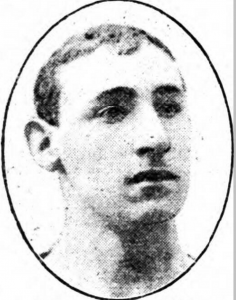1904-05
- No longer a ‘nearly’ club?
- 8 game winning run
- International honours
If Partick Thistle had earned a reputation of being a nearly club in the early years of the 20th century – not good enough for the First Division but too good for the Second – everyone at Meadowside hoped they could see change happening. The club had been promoted for the first time in 1897 only to be relegated on two occasions back to the Second, but only remained there for a single season on both occasion. Up, then down, then up, then down, then up again.
However, 1903, and then 1904, had seen improving league positions as the club began to establish themselves as a stable member of the top division, not challenging at the top, but not troubling the League AGM when votes were cast to relegate or retain the failing clubs of the division. Indeed 1903-04 season saw the club record their best results, ending with the most points yet recorded since they first played in the First Division, in 1897.
The season previewed
The club officials were in buoyant spirits on the eve of the 1904-05 season. Noises out of Meadowside suggested they hoped for a better performance than the previous season and “a team equal to any yet brought forward together” – a boast indeed.
The Evening Times previewed the season:
In some previous years the Partick Thistle officials have had many anxious moments about retaining their place in the First Division, but all that seems to be a thing of the past. The figures put up by them last season in the league competition points to their having got beyond the doubtful stage, and in this connection, no other club has had a more varied career. First promoted in 1897, when they entered into occupancy of Meadowside Park they have since then been twice relegated to the lower division but only remained their one season on each occasion, having by consistent play earned well merited promotions. They now enter upon there third successive year in the ‘upper circle’ of football, and, as their score of 27 points last season was the best in their history, they now look upon their place there as a permanency. Gratifying as this is, the officials are hopeful of achieving better results in the season about to be entered on.
They come to the scratch again with their affairs in the most promising condition and a team equal to any yet brought forward together. It may at once be said that there will be a good few changes, and, while no sensational captures are to be chronicled, care has been taken in selecting suitable men for the vacancies. After the departure of Leiper for Motherwell, the want of a reserve back was severely felt, and in addition to Campbell and Wilson, [John] Gilligan (Dundee Wanderers) has been secured. Gilligan is a clever player, with youth on his side, and good judges predict for him a brilliant career. At half back the only newcomer is [David] Melville (East Fife) and if he plays up to his trial games his place in the team is assured. Coming to the forwards, it is here that most of the planning and fixing will have to be done, for no fewer than four new men have already been secured. The new centre forward, [Henry] McIlvenny (Hamilton Academicals) is a most artistic player and a prolific goalscorer. He will have a capital understudy in Reid, a promising junior from Dundee Abbot. For the left wing a rattling good pair has been secured in [John] Drummond (Manchester City) and [John] Curran (Hamilton). Crawford has retired from the game, and the directors hope to sign on a well-known junior outside right when the season opens. The following is the list of professionals signed on up to date:- Goal, Wilkie and Howden; Backs Campbell, A.Wilson, Gilligan; Half backs Harvey, Walker, H.Wilson, W.Gray and Melville; Forwards Proudfoot, Massie, R.Gray, McIlvenny, Drummond, Curran, Reid.
In addition, the club will have the assistance of amateurs John Gillespie, A.McE.Swan, and W.Hamilton who will be at hand when their services are required. Training has been going on since 26th July, the committee recognising that timely preparation is essential in competitive football. Mr John Nott again acts as trainer, and Mr John McLay (late of Minerva) has been appointed assistant.
The playing pitch has been nursed as if it was a bowling green, and in accordance with the League mandate 13 turnstiles will be in operation at the entrances by the opening day.
The officials are practically the same as last season, and this ensures enterprise, without which no organisation can succeed. Under limited liability, the financial results were not so satisfactory as the general play of the team warranted, but this is accounted for by being dropped in the first round of the Sottish tie, and a like catastrophe is not being reckoned on. Everything considered, the Thistle are well equipped for the work before them, and the management are determined to make the old club a power in present day football and worthy of the large constituency from which they derive their support. Port Glasgow Athletic open Meadowside on Wednesday, thereafter the serious work of the League begins with Celtic at Meadowside this day week.
The Times article didn’t report that two of the previous season’s stars were missing. Sam Kennedy and John Wilkie were experienced men, both had scored eight goals the previous season, but neither had been happy with the terms offered by the club, and had refused to sign for the new season. Players unproven in the top division had been signed to replace them. Last season’s left back Andy Wilson had been ill throughout the close season and was considered a doubt for the start of the season.
As the football fans in Partick waited for the new season they were entertained by a series of Greco-roman wrestling matches at Meadowside between local policeman Alex (A.A.) Cameron and Russian George Lurich. Cameron was a remarkable athlete, known locally as the Champion Athlete of the World, who at the time held twelve world records for heavy weight competitions. Lurich won the first bout in a controversial manner, and took the £100 purse, but in the rematch Cameron won, and was carried from the Meadowside pitch, shoulder high, by his supporters.
Season begins
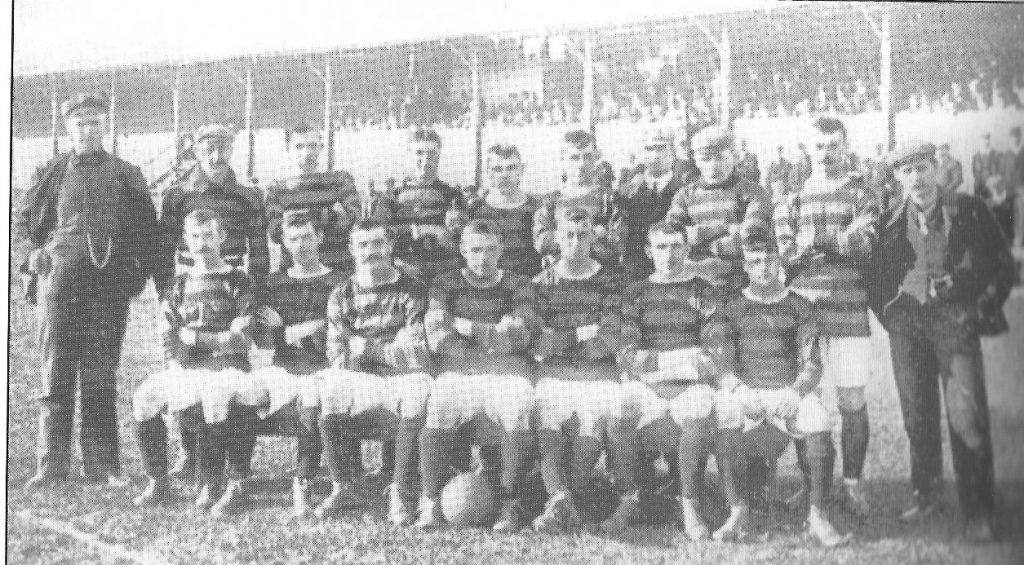
Three friendlies against lesser teams started the season in unremarkable fashion and the new team (six new players played against Port Glasgow and lost 1-2) showed little consistency. The first game against Scottish Cup holders Celtic at Meadowside was a tougher proposition altogether. It was little surprise that Thistle struggled, and the 0-5 score didn’t flatter the visitors. Selection problems meant a weaker team than was expected and suggested that not all was well with the team, even this early in the season. Bob Campbell had been moved from right to left back to replace Andy Wilson and he struggled, giving away a penalty (which Willie Howden saved, and injured himself) and a free kick from which Celtic scored.
Neutral linesmen were being introduced to games in an attempt to reduce the dissent shown to referees, and against Celtic the value was shown when a shot from Celtic’s Bennett hot the bar and bounced down. The refree stopped play and consulted with his colleague who confirmed that the ball had been over the line. The Thistle players accepted the decision with good grace, although if the score had been closer than 0-3 at the time who knows whether they’d have accepted the decision.
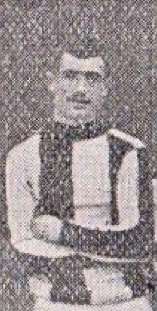
Sam Kennedy
The next few games didn’t improve much. Terms were agreed with Sam Kennedy and he returned to play at outside right, partnering ex Celtic and Manchester City forward Jimmy Drummond, and both played well in a 2-2 draw with St Mirren.
However, this was followed by a disastrous 1-8 defeat at Ibrox – the worst defeat the club had experienced. The team was full of changes from the previous week as the selection committee struggled to find a team able to live up to the pre-season hopes. Athletic News pointed out that Rangers were in exceptional form and “the Thistle are by no means a lot of duffers”. Andy Wilson returned from illness but couldn’t have chosen a more difficult return. His return may have been premature as he made only a few more appearances through the whole season as Thistle never managed to replace him effectively.
New players required
Clearly the pre-season optimism had been speculative, but the committee acted quickly after the poor start and before the next league game three new faces had arrived at Meadowside. Rangers’ reserve left back George Gillespie was signed to replace the struggling Wilson while highly rated James Sommen, an outside right, signed on from Motherwell.
The marquee signing, though, was Neil Gibson. Although Gibson was 31 years old, and had just been rewarded for almost ten years of service for Rangers with a benefit match against Celtic two weeks earlier, it was felt that he still had a contribution to make. Neil was one of Rangers’ best players in a spell which saw them win four league titles in succession (1899-1902), and three Scottish Cups – 1897, 1898, 1903 (though he only played in the first two matches of the 1903 Final). He had also won 13 full international caps and played 11 times for the Scottish League.
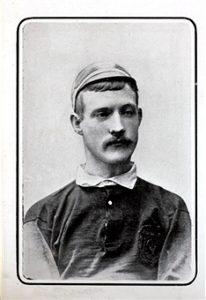
Neil Gibson
In a 2-0 Glasgow Cup win over Clyde Gibson was the best half-back on the field in the first half, although he tired towards the end. Robert Campbell, at right back, again had the physical side of his game spotlighted by the press. The Daily Record reported that he had cleared his lines well but when opponents were close by his play was risky, and he gave away a penalty and fouled Clyde forward Wightman to the extent that he had to leave the field. The Evening Times suggested that Campbell’s burly style needed toning down.
Thistle people quickly came to Campbell’s defence, and the Daily Record reported:
Meadowside people consider that Robert Campbell, the Partick Thistle back, has been somewhat harshly and unjustly criticised in recent matches. They point out that it was not Campbell who collided with Wightman in the Clyde match, but Melville, the centre half, and that the injury that the Shawfield player sustained was as a result of accidental contact. A Partick correspondent says if Campbell was in the Rangers, Celtic or Queens’ Park team he would be acclaimed as the best back in Scotland, but because he has the good faith to stick to the Thistle he is fair game for everyone to have a kick at.
A change in fortunes
A month of erratic performances from mid September, particularly from the Thistle forwards, had the committee considering further changes. While there had been some good performances, home and away wins over Hearts in particular, it was felt that the forwards needed an experienced player who could do a similar job to the one which Neil Gibson was doing in the defence. They resolved their issues with John Wilkie, and the inside forward returned to the team.
Wilkie made his first appearance against Morton, teaming up again with Robert Gray on the left wing, and he scored as Thistle recorded their third win in a row.
Robert Campbell, previously accused of rough play after a game against Clyde, and consequently defended by the club, was suspended for a month by the SFA for “alleged misconduct on the field” after being sent off in the 0-3 defeat by Airdrie. At the same meeting the club officials were censured after the match officials were pelted with stones by fans at the end of the Airdrie game at Meadowside. The Thistle committee responded by printing posters to warn fans about their conduct.
At the end of October William Massie travelled with the Glasgow select team to play Sheffield at Bramall Lane. Massie played but Glasgow lost the game 0-2.
Also in October James Drummond’s Partick Thistle career came to an end after just five games for the club. Drummond had been unable to get a regular game, even in a team which wasn’t playing well, and he often looked unfit. His last game was in early October and his contract was terminated soon after. The player claimed to the SFA that Thistle had acted unfairly but Thistle replied that he had never been fit, and his allegation was dismissed. Drummond had seemed to be a star in the making when he signed for Manchester City from Celtic alongside Willie McOustra in February 1902 (for the then enormous sum of £600) but he made little impact in England before signing for Thistle. The transfer had cost Thistle over £100 – £50 to Manchester City and the remainder to the player.
Improving results
The improved results continued through November. Wins over Motherwell, Port Glasgow and Queens’ Park took the winning run to six games – a club record – and the team to fourth in the league behind Airdrie, Celtic and Rangers. There had been good individual performances – Wilkie, Sommen and Kennedy up front, Gibson and Harvey further back, and Howden in goals, but the entire team were playing well – invention up front and organised at the back. The only disappointment was the crowds at Meadowside, which many reckoned weren’t rewarding the good football being played, and perhaps the best team Partick had produced.
The Scottish Weekly Record blamed the prevailing economic conditions in Glasgow:
But for the depression in trade, the Thistle would be basking in the sunshine of financial prosperity, but meantime they must jog on till such time as the working man will be in funds. Then we should see the brilliant performances of the Meadowside players commanding the support that is meantime withheld.
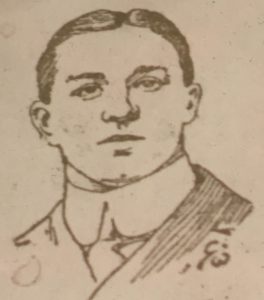
William Tennent
William Massie had suffered an injury against Motherwell and was immediately replaced by 17 year old William Tennent for the next match. Tennent was still at school, having spent time at Merchiston in Edinburgh, and Glasgow High.
The run continued in December with wins over Third Lanark and Kilmarnock. The Evening Times were happy to give Thistle plenty of credit.
The Partick Thistle’s recovery is as complete as it is creditable. It is a far cry from a record defeat to a record in successive victories, yet the persevering representatives of Meadowside have splendidly succeeded in bridging the gulf, and have gained enviable éclat and position in consequence. Long may their bow abide in its strength.
I was present at Meadowside last Saturday and I was a witness of Thistle’s seventh successive success. It was a great performance, brilliantly achieved. There was little if any luck in it, and it was characterised by unquestionable merit. The team moved well, with both pluck and skill, and in effective combination, which I should say was its strong point. They deserved all the encomiums passed upon them by the spectators as they left the ground. The same form and spirit maintained on the part of the players is almost sure to permanently improve the position of the club.
The immediate effect of it has been to lift them into third place on the league table, close behind the heels of the two clubs between whom the championship is supposed meantime to lie. I am not so sanguine as to anticipate that they would be able to climb higher – because that would possibly involve an uninterrupted compilation of victories right onto the end of the chapter, and I do think that is a little much to look for, even from them in their present form. But third place on the completed schedule would be so great an advance as to amount to a veritable triumph.
Beating Hearts, Dundee, Morton, Motherwell, Port Glasgow, Queen’s Park, Third Lanark and Kilmarnock was all very well, and those types of performances for the rest of the season would almost guarantee third place, but improving on that needed wins against Celtic and Rangers. Celtic were next up…
“The Thistle have certainly developed a paying game which consists of refusing to hang onto the ball. “For goal always,” is their motto and they act up to it in all sorts of ways.” (Athletic News)
Record breaking form
Celtic hadn’t been in great form, while there was little doubt that Thistle had been. The club committee offered a gold watch to each player to lift their game and beat, or at least draw with, the league leaders. The game captured the interest of the city’s football fans.
The question is being canvassed with an eager uncertainty never previously shown in connection with the fixture – can the Celtic slay the successful march of the men from Meadowside to whom so many of our best teams, one after the other, in surprising succession, have already surrendered. On paper the result should go to the leaders, who, considering their position, their play, and their potentiality, are rightly esteemed as being in front of Partick’s most potent possibilities. But the same conclusion was also, and perhaps even more confidently asserted with regard to more than one of the Thistle’s recent victims; and paper form, while it may constitute a certificate of high status, is no absolute and unfailing guarantee of successful achievement. The Thistle within the past two months has so frequently torn paper form to tatters that no club, and last of all the Celtic, would trust to paper form alone. (Evening Times)
The game at Celtic Park was one of chances, for both teams. For Thistle, Neil Gibson and Robert Gray both had opportunities that hit the bar, while Sam Kennedy scored his sixth goal in four games, and Gray scored too. Celtic equalised the game at 2-2 with a penalty after Howden had “ducked” McLean under the bar. The match had been marred by “a good deal of hacking and foul kicking” by both teams on a muddy pitch that Thistle adapted better to, with long passes and quick shooting rather than their hosts’ attempts to play through the mud which allowed the Thistle backs to clear the ball. The main flashpoint in a niggly game came in the last minute when James Sommen barged the Celtic half back Jim Young. Young’s reaction was as excessive as it was violent, and he threw himself with a “flying rush” at Sommen, who was carried off. In the disciplinary meeting that followed the referee said it was the most brutal act he had ever seen. Young, in his defence, said that “Sommen rushed at me and lodged on my stomach with his knees. I rose dazed and half mad and attacked Sommen.” Young was suspended for a month for the foul.
The players were disappointed not to have beaten Celtic – evidence of how far the team had come. Thistle had never previously beaten Celtic at Parkhead, and the players received their gold watches as promised. “Let Celtic or Rangers make a mistake or two, and the Championship may go to Partick for the first time,” said Athletic News.
There was disappointment, but a quick opportunity to get back to winning with a visit to Airdrie a couple of days before Xmas. Thistle had lost to Airdrie at Meadowside in October in a game which saw Bob Campbell suspended for the next month, but this did Thistle a service as it required Tom Harvey to move to right back, and in doing so become regarded as one of the best defenders in Scottish football. Since that game Thistle had won eight games in a row while Airdrie had won just one in ten matches.
Unfortunately Harvey and most of his team mates had an off-day and Airdrie won 3-0. The result allowed an un-named Edinburgh Evening News journalist to vent what appeared to be some pent up animosity, perhaps as a result of the poor displays Hearts had put up against Thistle earlier in the season.
Saturday at least settled the claims of Partick Thistle to an off-chance part in the Scottish League championship. It was the feeling of most people, in the East, at all events, that as championship aspirants Partick Thistle were as rank imposters as Airdrieonians, and as the latter began at Airdrie where they left off at Partick – scoring 3 goals and losing none – we should hear rather less of Partick Thistle than we have been doing for some time past.
In reality, though, the defeat at Airdrie did end Thistle’s aspirations of finishing high up the table, and began a run of five defeats and a single win over the holiday period. The players looked tired and a run of injuries to Tennant, John Wilkie, Gray, Massie and Campbell didn’t help the performances either.
William Massie broke his arm against Rangers and although he had been a regular for two and a half seasons he struggled with fitness and never regained his place in the team. He left to join Port Glasgow Athletic, and subsequently a number of other clubs, the following year.
Scottish Cup preparations
The season had been made up of three parts so far – a poor start until October, a fantastic run of eight wins, followed by a terrible run in January. Despite the league performances, the committee had hope that the Cup could see an improvement, but felt that a change to the pre-match preparation was needed for the first round game against Hibs. Rooms were booked at Glenburn Hydro on Bute for the players, trainers and committee members for a fortnight before the tie, to recuperate, train, and to play some golf (six broken clubs were handed back to the hotel), at a cost of £3 per man per week. This was a radical move for the club – they had never tried this approach before. Hibs preparation was to spend 12 hours a day training at Easter Road.
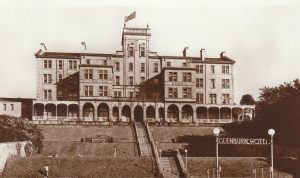
Glenburn Hotel
Half way through the Scottish Cup preparations the team returned to Glasgow for a league game against Dundee. There was a poor crowd – fans were disappointed with recent form – but the first half performance was the best since the start of January, and Thistle won 2-1, then returned to Glenburn and the golf.
In late 1904 Rangers’ Scottish Internationalist right back Nicol Smith contracted a gastric infection and after a rapid illness, died in early January. The death shocked Scottish football, and Rangers moved to replace Smith a couple of days before the first round of the Cup, signing Thistle back Bob Campbell. Campbell had joined Thistle in 1898 and played over 200 times before he moved to Ibrox.
It was felt that the transfer wouldn’t affect Thistle too much. Campbell had missed most of current season through both suspension and injury, and Tom Harvey had been an effective deputy.
Harvey continued at right back against Hibs in the Cup, and the extra training may have paid off as Thistle ended the game the stronger team, although it finished 1-1. Howden had kept Thistle in the game in the first half with some excellent save. The keeper had been in great form throughout most of the season.
The hotel on Bute wasn’t available when Thistle tries to return to prepare for the replay so they travelled down the Clyde to a hotel on Gare Loch instead. The Thistle committee’s investment in team planning hadn’t been missed – The Edinburgh Evening News reckoned the club “have set their sights on the Scottish Cup, given the preparation and inducements offered to the players.”
There was a huge crowd at Meadowside for the replay – 16,000 people and record takings for a game at the ground of £415. The international selectors even turned up to watch several players prior to the international matches coming up. The pitch was in very poor condition and made good football impossible.
Both teams played well but Hibs came up against an in-form Willie Howden again, denying Hibs over and over. “A display never bettered by a Partick goalkeeper”, reckoned the Daily Record. At the other end Wilkie, Bobby Gray with two, and Willie Gray scored in a brave 4-2 win. Sam Kennedy needed treatment for a knee injury before and at half-time, while Gilchrist picked up a bad injury. Sommen had been injured at Easter Road, and looked unfit. He retired from the game at 4-0 leaving Thistle with ten men and several other injuries. However, they survived to reach the second round to justify the pre-match expenses.
The draw for the next round took Thistle to non league club Kirkcaldy United, and the first thing the committee did after the draw was to offer United £50 to switch the game, plus a half share of all takings over £100, but the offer was rejected. Instead the home team invested in adding extra terracing to accommodate the crowd. The draw had created great excitement in the town.
There were no extra pre-match preparations this time and the Thistle players were subjected to a much more difficult game than most had imagined and Howden was kept busy. The pitch was much narrower than league clubs used and United missed a penalty in the last few minutes, shortly after Thistle had scored the only goal of the game. The home team would have fully deserved a draw and a game back at Meadowside. It was a narrow escape and improvements would be needed if the committee’s aspirations were to be matched.
A home draw would be nice. Thistle hadn’t been drawn at home in the Cup for six years, and they got perhaps the worst possible draw – away to league leaders Celtic. The committee immediately resolved to replicate the Hibs games’ preparation and booked rooms at the Skelmorlie Hydro on the coast.
The biggest crowd Partick Thistle had played in front of – 28,000 – gathered at Celtic Park and all were let down by a poor game from both teams. Ironically, Howden, so often Thistle’s saviour, scored an own goal in the first half. Sam Kennedy, not fully fit, was risked and played poorly as did all of the forwards. James Sommen, so often a problem for Celtic, was marked by two defenders when he got the ball. Neither defender was Jim Young who had been suspended earlier in the season for a foul on the Thistle player.
The week before the Celtic Cup game Thistle had played Third Lanark in the League with an under strength team, losing 1-6, and the club were disciplined for this by the League committee later in the season. It would have been worth it had the rested players played a better game at Celtic.
Thistle were out of the Cup, and in fourth place in the league, at the start of March. With no relegation worries (there was no automatic relegation and clubs were voted out by committee if they had performed badly) there was little to play for other than to start building a team for the following season. One bright spot was an invite to play in the Glasgow Charity Cup which was a prestigious end of season competition. Thistle had been asking to play in the tournament for years but had never been invited.
International honours
The international selectors at the Hibs game must have been impressed by Sam Kennedy and he made his first, and only, appearance for the national team – a late replacement for Quinn of Celtic – against Wales at Wrexham. He created chances for himself with his bustling style, but didn’t combine well with his team mates. Athletic News described him unkindly as “uncouth and clumsy.” Scotland lost 1-3.
Two weeks later Scotland hosted Ireland at Celtic Park and Willie Howden and Neil Gibson were rewarded for their performances with caps. It was Howden’s one and only cap but his selection didn’t meet with universal acclaim. The Glasgow Weekly News suggested there were better goalkeepers. He had little to do as Scotland won 4-0. Athletic News published a short profile of Willie in the week following the game.
Willie Howden
Goalkeepers, we have often been told, are born not made. According to followers of Partick Thistle, Howden is a born custodian. And yet it is only now that he has burst, with all the refulgence of greatness, upon an eager public. Bt true merit is always modest, and very often t is only discovered by accident. It is only since Howden joined the Thistle that people have begun to applaud his work and chant his praise.
Howden is 25 years of age, and was born in Renfrewshire. He played as a junior for Rutherglen Glencairn, from which senior clubs are always, now and then, culling players who are flowering on to fame. Howden first of all signed for the Rangers, and four years ago was transferred to Partick Thistle. He is not a flashy custodian, but he is safe and daring when the occasion desires. His cap against Ireland is his first honour.
Gibson’s selection too was criticised as being based on the past rather than his current form, although most match reports suggested Gibson was showing great form at the time. Neil captained the team but was criticised for being slow. It was his 14th (and last) cap, although his first as a Thistle player.
Three international caps for the club’s players was great recognition of the season they had had.
On the same day Thistle returned to Easter Road. It was a meaningless League game but Hibs were keen for revenge for the Cup result. It was a bad tempered game – hacking and tripping from both teams spoiled the game. It ended 0-4 to Hibs. Thistle’s form was described as being “sore and yellow”.
The final League game came almost a month later and ended in a 0-1 defeat at Motherwell. After such a great set of results before the turn of the year it was disappointing to everyone to finish in sixth place in the league. Another disappointment was the number of goals scored – despite the steadying influence of Neil Gibson there were difficulties in selecting a consistent defence.
| Pos | Team | Pld | W | D | L | GF | GA | GD | Pts |
|---|---|---|---|---|---|---|---|---|---|
| 1 | Celtic | 26 | 18 | 5 | 3 | 68 | 31 | 37 | 41 |
| 2 | Rangers | 26 | 19 | 3 | 4 | 83 | 28 | 55 | 41 |
| 3 | Third Lanark | 26 | 14 | 7 | 5 | 60 | 28 | 32 | 35 |
| 4 | Airdrieonians | 26 | 11 | 5 | 10 | 38 | 45 | -7 | 27 |
| 5 | Hibernian | 26 | 9 | 8 | 9 | 39 | 39 | 0 | 26 |
| 6 | Partick Thistle | 26 | 12 | 2 | 12 | 36 | 56 | -20 | 26 |
| 7 | Heart of Midlothian | 26 | 11 | 3 | 12 | 46 | 44 | 2 | 25 |
| 8 | Dundee | 26 | 10 | 5 | 11 | 38 | 32 | 6 | 25 |
| 9 | Kilmarnock | 26 | 9 | 5 | 12 | 29 | 45 | -16 | 23 |
| 10 | St Mirren | 26 | 9 | 4 | 13 | 33 | 36 | -3 | 22 |
| 11 | Port Glasgow Athletic | 26 | 8 | 5 | 13 | 30 | 51 | -21 | 21 |
| 12 | Queen’s Park | 26 | 6 | 8 | 12 | 28 | 45 | -17 | 20 |
| 13 | Morton | 26 | 7 | 4 | 15 | 27 | 50 | -23 | 18 |
| 14 | Motherwell | 26 | 6 | 2 | 18 | 28 | 53 | -25 | 14 |
In the Glasgow League a win and a draw had been recorded against Celtic, and a win against Rangers too. The return game at Ibrox ended in a 4-3 win for Thistle. The winner was a penalty by Robert Gray. Thistle gave a trial to left back McKenzie from Bo’ness – “kicking not too conspicuous but as a tackler he will take some beating” reported the Daily Record.
Not so very long ago the result of a Rangers – Thistle match left little room for doubt, for no matter how well the Partick representatives happened to be comporting themselves against other teams, they invariably got soundly thrashed by the Light Blues. But the old order has evidently changed, and for the second time this season, in the Glasgow League Championship too, the Thistle have put up victories against their more famous opponents.
Benefit for Wilson
Andy Wilson had been at Thistle for ten years, forming a successful full back partnership with Robert Campbell. He had made just a few appearances this year, unable to dislodge George Gilchrist from the position, and had been playing for Alloa Athletic for most of the season. Contemplating retirement, Thistle arranged a Benefit match for him against Celtic. Neither side was at full strength and a poor crowd attended. It seemed like a meagre way to say thanks for his years of service. Wilson signed for Alloa for the following season.
Thistle rarely held benefit matches for their own players, but they were known for playing benevolent matches for good causes. A match against Clyde to benefit for the widow and children of the late Andrew Johnstone as played. Johnstone had played a game for Thistle the previous season and had played for Clyde too. Willie Howden was in his usual place in the Thistle goal, and his brother wad the Clyde keeper. Both kept a clean sheet – the game was a 0-0 draw.
The season all but over, it was a time to let players leave who wouldn’t be part of the team next year, and to start to build a team for next season. Thistle had the basis of a team already signed up at the start of May: Willie Howden, Tom Harvey, Charles Smith, Archie McKenzie, David Walker, David Melville, Neil Gibson, John Lawrie (Clydebank Juniors), James Sommen, Sam Kennedy, John Wilkie, Robert Gray, James McGregor (Crieff).
Off the field there were rumours that the Thistle directors might employ a manager to look after the club.
Within weeks of signing, John Wilkie was on the move, joining his old Thistle team mate John Campbell at Hibernian. The duo had also played together at Blackburn Rovers and Rangers. It must have been a blow for the team – Wilkie had added some much needed experience in the forward line when he re-joined the club earlier in the season, and had missed just one game in that time.
Thistle had hoped to sign forward Peter Kyle, and the papers had announced his signing, but the agreement broke down and Kyle signed for Tottenham Hotspur instead. Kyle was known for having a fierce, unpredictable temper (once rejected by Clyde for this reason). He had joined Liverpool in 1899 but played rarely, joining Leicester City and West Ham United for a season at a time. He came back to Scotland and was playing for Royal Albert when Thistle approached him. His second spell in England was similar – short spells at Spurs, Arsenal, Aston Villa, Sheffield United, and Watford.
The Glasgow League ended late, in mid May. It had been a strange competition – three wins and a draw against Celtic and Rangers, and four defeats to Queen’s Park and Third Lanark.
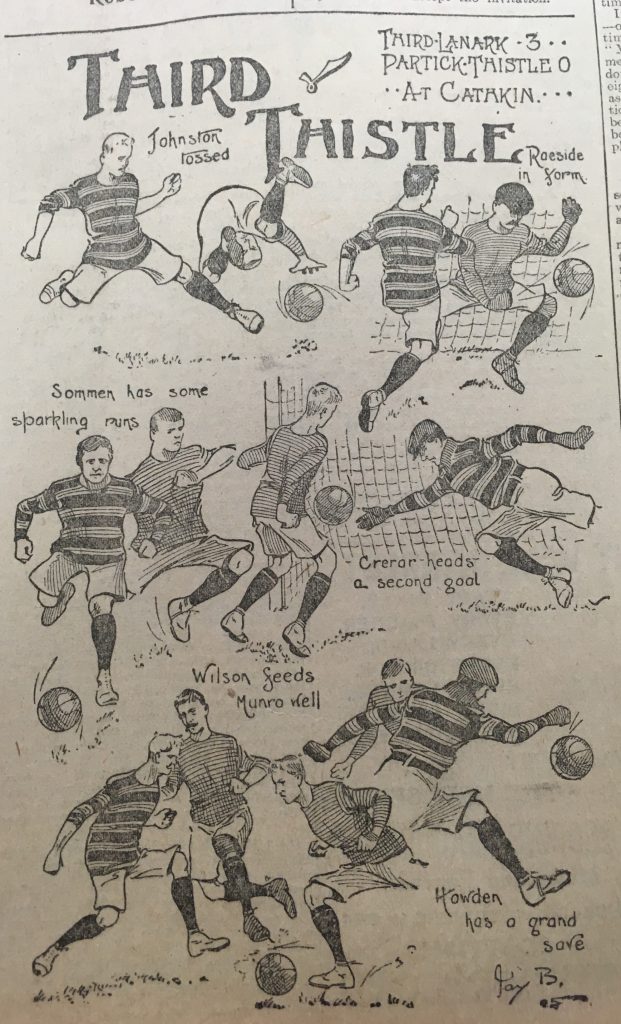
| Pos | Team | Pld | W | D | L | GF | GA | GD | Pts |
|---|---|---|---|---|---|---|---|---|---|
| 1 | Third Lanark | 8 | 5 | 1 | 2 | 14 | 8 | 6 | 11 |
| 2 | Rangers | 8 | 4 | 1 | 3 | 15 | 10 | 5 | 9 |
| 3 | Queen’s Park | 8 | 3 | 1 | 4 | 9 | 12 | -3 | 7 |
| 4 | Partick Thistle | 8 | 3 | 1 | 4 | 11 | 15 | -4 | 7 |
| 5 | Celtic | 8 | 2 | 2 | 4 | 10 | 14 | -4 | 6 |
But still the season was not complete. The long awaited Glasgow Charity Cup appearance arrived. It was a prestigious competition and over £24,000 had been distributed to charities since the competition started in 1877 – a huge amount in those days.
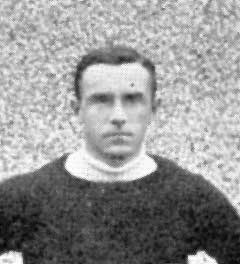
Dick Roose. Photo courtesy Wikipedia.
At Meadowside Rangers were the opponents, and Thistle hoped the English FA would allow amateur Dick Roose (the Everton and Wales international goalkeeper) to guest, but the FA vetoed the request as the English season had ended. Howden played in his usual place and Thistle destroyed Rangers 5-0. The Evening Times reckoned it was the best performance the Thistle forwards had managed in a season of great performances.
The semi final was played at Hampden against Third Lanark and Thistle led 1-0 going into the last ten minutes until an unfortunate own goal gave Thirds a replay. The replay ended 1-1 but Thistle had been awarded 7 corners to Thirds 0, and they were awarded the match.
The final came soon after against Celtic. It was a great achievement for Thistle, but unfortunately the football press had gone on their holidays. Not many details remain from the game. Celtic won 2-0.
At last, the Thistle players could end their season. For a season which had promised so much it finished in disappointment, despite it being the club’s best season since it had joined the League.
Player News
October
John Muirhead has been transferred to Clyde.
John Gilligan has been transferred to Clyde
Charlie Reid, previously of Dundee Abbot has been placed on the transfer list. He had been earning £2 per week.
November
J.Curran has been transferred to Hamilton
Henry McIlvenny has been transferred to Celtic. “He should go straight into the first team to replace Jimmy McMenemy.”
John Proudfoot transferred to Hamilton. He had been offered to Aberdeen in September but was considered too old.
December
Robert Connor transferred to St Bernards
January
John Hastie “secured from Bathgate temporarily”. Hastie is a signed Thistle player who was playing with Bathgate.
Thistle signed Ferguson of Maxwelltown Volunteers.
February
Campbell transferred to St Mirren
Thistle sign Lawrie (Clydebank Juniors), Wilson & W alter Arnott (both Linthouse) and Gregor (Crieff Morrisonians).
March
Thistle sign Stuart Strachan from Dumfries and Miller from 6th GRV
April
PT sign Archie McKenzie (Bo’ness) and Smith (Vale of Clyde)
May
Graham of Partick Athletic played for Thistle v Clyde.
Thistle sign Andrew Swan (ex St Mirren and Tottenham Hotspur)
Sources/References
- Evening Times July – May
- Daily Record July – May
- Glasgow Herald July – Sep
- Partick & Maryhill Press – no football content.
- Scottish Weekly News July – June
- Athletic News July – June
- http://calumimaclean.blogspot.co.uk/2013/04/lochaber-strongman-a-cameron.html
- http://www.thecelticwiki.com/page/Drummond,+James
- British Newspaper Archive July – May
Categories
- Miscellaneous (16)
- Other clubs (15)
- Players (26)
- Thistle – early years (48)
- Thistle – general (5)
Football history links
- Ayr United archive
- Bill Shankly
- Falkirk Historian
- Gallant Pioneers – Early history of Rangers
- Glasgow Herald archive at Google
- Hibernian
- Hibernian Historical Trust
- London Hearts
- Partick Thistle history archive by StuTheJag
- Rangers History
- Scottish Football Historical Archive
- Scottish Football Museum
- Scottish Sports History
- ScottishLeague.net and forum
